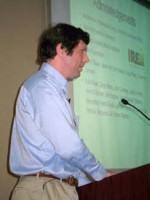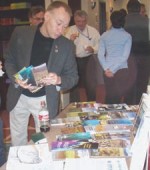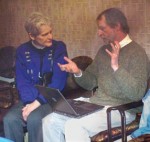Speakers at this year’s Annual LTER Mini-Symposium at the National Science Foundation (NSF) found themselves presenting in front of a very packed room. Their talks focused on the interactions and feedbacks between society and ecological change, and how they relate to sustainability of the earth’s ecosystems. This focus on interdisciplinary integration attracted a diversity of audience members, including employees from many NSF directorates, Congressional staffers, representatives from various federal agencies and non-governmental organizations in the DC area, and the attaché for Science and Technology from the Embassy of France.
After welcoming comments by Henry Gholz, the LTER Program Director at NSF, Jim Collins (NSF Assistant Director for Biological Sciences) opened the symposium by highlighting how the LTER Network exemplifies the importance of long term investments in research. Collins commended the LTER community for strides it has made in integrating the biological sciences and social sciences. Scott Collins (SEV), leader of the ongoing LTER strategic planning process, followed with an overview of the process and a discussion of how the LTER community had developed the theoretical framework for this approach over the past two years. He highlighted the inadequacies of previous attempts to understand changes in socio-ecological systems in the absence of such a framework.
Five presenters then illustrated how this framework provides critical integration of the natural and social sciences at their individual LTER sites.
Steward Pickett (BES) led off this section discussing how standard ecological techniques can be used to understand urban ecosystems, in which humans and their behaviors must be regarded as inherent and integral parts of ecosystem functioning.
Terry Chapin (BNZ) discussed the ecological and social implications of climate change and wildfire occurrences in Alaska, highlighting changes in the central role of fire to Native Alaskan communities.
Steve Polasky (CDR) presented an economic analysis comparing high-diversity natural grasslands, as a potential source of biofuels as substitutes for fossil fuels, to intensively managed grass monocultures.
Dan Reed (SBC) highlighted the importance of long-term data for understanding the effectiveness of environmental policies, in this case the use of basic ecological information to develop and assess marine fishery reserves off the coast of California.
Finally, David Foster (HFR) provided vivid examples of changes in key interactions between forests and people in northeastern United States over the past 200 years, illustrating why the services provided by ecological systems must be explicitly acknowledged in order to appropriately address conservation goals.
In a wrap-up talk, Debra Peters (JRN) synthesized the talks. She promoted the development of large, cross-network, interdisciplinary collaborations involving LTER and non-LTER sites in order to generate a new level of understanding of the dynamic interactions among ecological and social processes over time and space.
As in previous years, the 2007 Mini-Symposium showcased the unique role of LTER in advancing ecological science. This year's theme of integrating the social and ecological sciences in a long-term theoretical context, with highly diverse examples of new research, insights and collaborations, was especially well received.
To add your (or someone else's) name in the DC area to the invitation announcement list for next year's event, please send your name, organization, and email address to Henry Gholz at hgholz@nsf.gov.

 Enlarge this image
Enlarge this image



